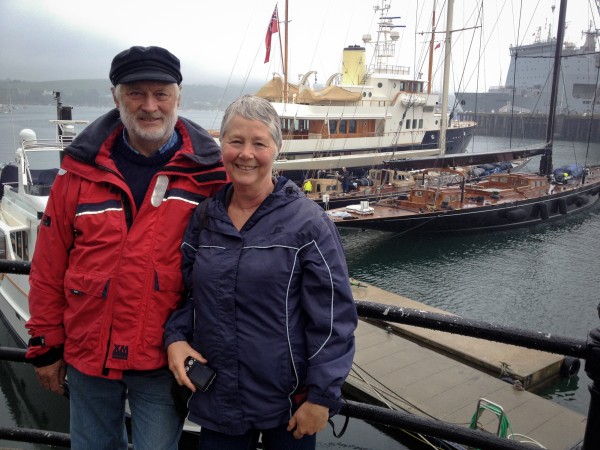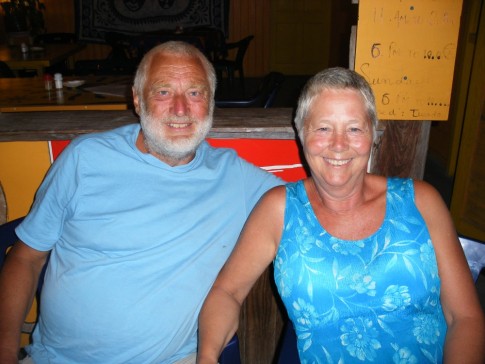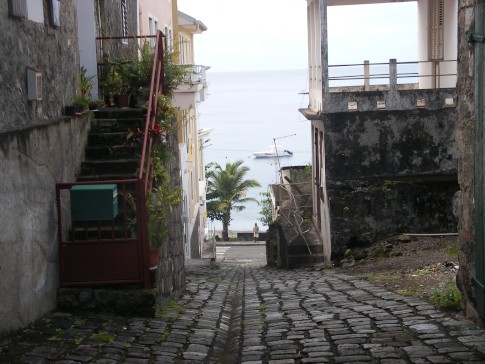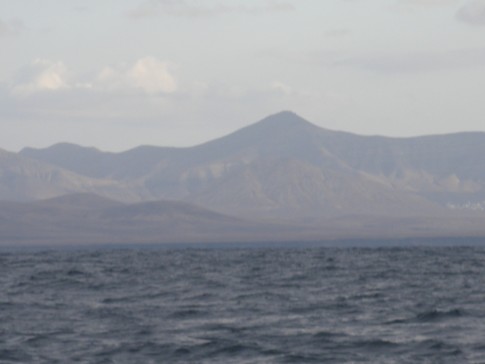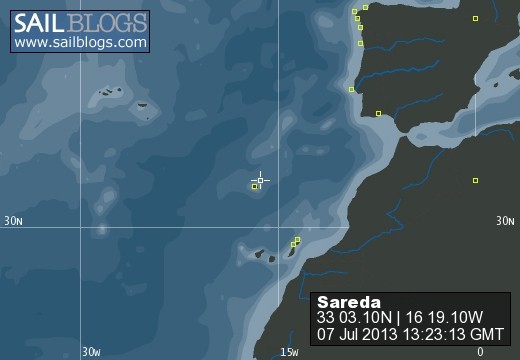
Sareda - The Voyage
07 July 2013 | Porto Santo
18 June 2013 | Ayamonte
12 May 2013 | Morocco
10 September 2012 | La Linea
19 August 2012 | Portosin
02 July 2012 | Falmouth
04 April 2010
09 February 2010 | Grenada
08 July 2008
08 July 2008
16 April 2008
05 February 2008
19 January 2008 | Barbados
24 December 2007
26 November 2007 | Lanzarote
30 October 2007
23 October 2007
27 September 2007
06 September 2007
30 August 2007 | Pavoa de Varzim
Las Palmas to Cape Verdes & across the Atlantic to Barbados
19 January 2008 | Barbados
Lin & Paul
Las Palmas to Cape Verdes
Paul.............
We set off from Las Palmas, Gran Canaria at 14.20 on Saturday 8th of December heading for the Cape Verdes 830 miles away and off Africa's West Coast. Although we enjoyed the bustling town of Las Palmas with its department stores and the most amazing fresh fruit and vegetable market we have ever seen, we were not sorry to say goodbye to the anchorage which, being a major commercial port was dirty, uncomfortable and oily - we had to clean the topsides of oil on three occasions. Also leaving were Solara and Apple but by first night they were both out of sight as we navigated our own courses South.
Down the side of Gran Canaria we entered a renowned "wind acceleration zone" and were making over 8 knots with strong winds dead astern but these moderated as we cleared the island and we settled down for the longest passage to date.
Day 1 saw us covering 124.5 miles, quite a respectable distance with an average speed over the ground of 5.19 knots.
Over the seven days we took to reach the Cape Verdes we had strong winds, some big swells and some periods of light winds and calms. Our watch system of four hours on and four off worked well although Lin felt a little poorly at one point as she forgot to take her anti sea sickness tablet.
Night watches were taken sitting in the cockpit looking at clear, star filled skies - we had some glorious moments but also times of intense activity as, for instance, when the wind backed and the main and preventer along with poled out Yankee (high cut jib) had to be changed to the other side of Sareda. This took about 45 minutes in a rolling sea.
We eat well on passage having three main meals, breakfast, cooked lunch or sandwiches and a cooked evening meal, usually curry, pasta, nut roast, stew etc. Meal times are really the only time we meet as all other times one is sleeping or on watch.
Just before the half way mark at 1400 on the 11th December we crossed the Tropic of Cancer.
On Friday the 14th we saw our first shoal of flying fish - these are fascinating to watch as they fly for many metres, skimming the waves until they finally 'plop' back into the water. We have also found the odd few unfortunate ones who have flown on deck during the night and expired, however I did manage to save one about 8" long which flew into the cockpit and I sent him on his way back into the water.
Ilha do Sal was sighted on the horizon on Saturday 15th and we dropped anchor in Palmeira anchorage at 1800. Geoff in Siesta, a fast Sparkman and Stevens sloop, had arrived before us but Apple arrived at midnight entering the unlit bay in the dark - very brave! There are only anchorages in the Cape Verdes as the marinas have not made any impression on the rather remote African islands, although there is a basic marina being built in Mindelo where we intend to book out for passage to Barbados. We will anchor, of course, because it is cheaper!
Lin..............
Geoff rowed over to see us on Sunday morning and joined us for coffee and we discussed the most enjoyable passage.
Later that day we went ashore and were struck by the difference in culture. There were a lot of unfinished one-storey houses made of breeze-block, these are home built and some were inhabited with building work still continuing. There seemed to be high levels of unemployment with many people around with little to do.
The shops were lacking in fresh veg and bread was hard to obtain - in fact many items we were accustomed to buying were lacking eg brown rice, flour, eggs and weetabix. We found ourselves queuing with the locals to fill our containers with drinking water from the communal supply but a willing young lad offered to take it back to the dinghy on our trolley unlike the local young girls who carried 5-10 gallon containers on their heads - we tipped him well.
Young children played safely and happily in the street and the little girls played with their 'white' dollies. I took a photograph of some children shaking fresh figs from a small tree - no doubt a welcome addition to their diet.
The next day we, together with Martin, Roma and Geoff took an 'Aluguer' into the nearest town, Vila de Espargos. 'Aluguers' ranged from pick-up trucks with benches in the back to small mini-buses - we negotiated a price of 500 escudos each (about 30p) for a lift in one of the latter, but they don't leave until full - fortunately not too long!!
Vila de Espargos was the main town on Sal. There were two banks but until very recently both of the cash dispensers outside only accepted the local cards - however, we were lucky the second one accepted our Visa debit card and we were able to withdraw Escudos - which saved us having to return the next day with our passports and join the long queue outside the bank.
Women and children sat on the roadside in groups selling fruit and veg from baskets. I took a photo of Paul, Martin and Roma choosing from a selection. I took a picture of a pretty young coloured child and was asked for payment by her Grandmother - we had been told that Euros were as acceptable as Escudos so I gave the little girl about 70 cents in change - her Grandmother soon corrected me - only whole Euros were accepted - but it was worth it.
We had an acceptable lunch, omelette, chips and side salad before finding another Aluguer and heading back to Palmeira - Paul didn't once worry about Sareda - he is becoming more confident in his anchoring skills especially now the weather is more settled.
On the 19th December, at 08.00hrs we weighed anchor again and headed for the Ilha de Boa Vista, 38 miles away. It was a pleasant day sail and Geoff managed to take some photos of Sareda sailing and we reciprocated by taking some of Siesta. Martin and Roma were ahead of us - we had planned to anchor in the Northern anchorage of Sal Rei, however, we saw Apple rapidly changing course at the last moment as they were about to enter the harbour - a heavy swell was present at the entrance and the rollers were breaking - it was too hazardous. We therefore continued around to the Southern anchorage. We anchored at 16.30 - there were several boats in the anchorage but it was approximately a mile in the dinghy to town and there were reefs all round with the big swell breaking over them.
Paul cooked a good dinner and afterwards Martin, Roma and Geoff came over for a drink. We had a pleasant evening and would have slept well that night but the anchorage was very rolly due to the swell coming down from the North and we were kept awake by the anchor chain rumbling on the rocks below. We were at the edge of the anchorage and at first light we moved further in to deeper water.
We had breakfast and decided to go ashore. It was a wet trip in due to the swell but we were able to pull the dinghy up onto the beach - a young girl - late teens - helped us haul her up before running off to join her friends.
The atmosphere on Boa Vista was friendlier and the people seemed happier. Even before we left the beach a young man called Benjamin introduced himself to us and took us to the nearest bank machine. We bought some fruit and veg at the market and after asking where we could find bread another young fellow shut up his arts and crafts stall and took us to a place that sold bread rolls. Everyone seemed very friendly and helpful. It was very warm and we stopped at a small bar and had a cold beer which went down well.
We paused to look at the young girls selling fish on the quay - I asked one if I could take a photograph of her with her baby strapped to her back with a cloth - she was very willing and tried to give me the Euro back that I had given her for the privilege.
Although we had originally planned to spend Christmas at Boa Vista with the others we weren't happy with the anchorage and decided to move on.
We wanted to go to Mindelo on Sao Vincente where we could get our passports stamped and gather the relevant documentation that we would need to enter Barbados. However, the island was 140 miles away - a passage that would take about 28-36 hours at an average speed of 4 � - 5 knots.
The pilot book advised that we should not arrive at any of the islands in the dark as their navigation lights were often not working - we did not see any working navigation lights at all, as it happens, during our whole stay!!
We decided that to ensure we did not reach Mindelo at night we would head for Sao Nicolau which was en route approximately 80 miles away. We planned to weigh anchor at 5.30pm which would make our arrival in Sao Nicolau early the following afternoon. We said goodbye to the others hoping to see them at some stage in the Caribbean.
From Boa Vista to Sao Vincente (Mindelo)
Paul.........................
I really didn't like the anchorage in Boa Vista and we left the next day to get to Mindelo in a force 5/6 trade wind again from astern. We made a very fast passage to the half way mark of Sao Nicolau where we were to stop for a day and night but the weather was clear and we opted to keep going expecting to arrive at Mindelo before nightfall - however, we were hit by a gale with huge swells but being past the point of no return, headed onward under three reefs in the main and storm jib. We were effectively on a lee shore for the next fifty miles as there was a chain of uninhabited islands on our Port side. Lin felt rather poorly but still completed her watch which was just as well as I had to stay awake due to the difficult sailing.
We had one scare when a jib sheet shackle broke and pandemonium hit us as ropes thrashed about before we could tame them and carry out an emergency repair which took the best part of an hour. The wind and waves also swept our staysail bag overboard breaking the ties and blowing the sail up the baby stay just through the wind velocity - again I had to go on deck, lashed on of course, to retie the sail, we were both soaked through from breaking waves - no RNLI to help out down here!!
The last part of the passage - the run between two islands to approach Mindelo, was also rather disturbing - although warned about in the pilot book we didn't expect the nasty breaking seas that threatened to turn us over as each one reared up from astern, breaking with a deafening "whoosh"
We were very glad to arrive safely in the comparative shelter of Mindelo which is the main port of the Cape Verdes and dropped anchor amongst freighters, tankers and fishing boats at 1800hrs.
Also there were Peter in Solara and Renardo, Nidia and Rihon from South Africa in Shuna - it was great to see them all again. We heard Peter, who had sailed directly from Las Palmas to Mindelo, nearly lost his mast as the back stay broke at the tang at the mast head. Only his ability and a well built boat (Nicholson 38 - 35 years old) saved him from serious disaster!
Mindelo - Isla Sao Vincente.
Lin.............
The next day we went ashore and encountered our first boat boy. In the poorer islands, and apparently in parts of the Caribbean, boat boys have become a tradition. We were met at the harbour entrance by Carlos who said, he would run errands, look after our dinghy and generally help us and we negotiated a fee of 500 Escudos per day (about �3.50) and true to his word we found his services very useful especially when checking in with our ships papers. There were three places to go to including the harbour office, immigration and the police station and Carlos paved the way for us. He was also able to take us to the bank machines and show us where to go for shopping etc.
After the Ilhas do Sal and Boa Vista, we found Mindelo to be vibrant and exciting. Music was playing throughout the town and everyone seemed happy and buoyant - of course it was only a few days before Christmas so this could have accounted for the exuberant atmosphere. The queues for the bank and bank machines were horrendous and each was guarded by a uniformed attendant, on more than one occasion we decided to go back later, but if we left it too long the machine would be empty and we would have to queue at another.
Certain items of shopping were impossible to obtain. Carlos took us everywhere looking for eggs. The previous day we happened to be lucky and we were in a store when a consignment arrived. We were going to pick up two dozen but everyone was restricted to half a dozen so we were once again looking for more. It did not help that Carlos did not really understand what eggs were and we were shown various cuts of chicken which we explained we did not want. In the end we had to give up. We still had a few that we had bought in the market in Las Palmas and these had to suffice to cross the Atlantic.
I also could not find any Weetabix. There were many cereals there but mostly the sweet and sickly ones which I do not enjoy. Eventually I found two packets of bran flakes but when we reached the checkout they charged us nearly 600 escudos each (over �5) but they made a good breakfast and were sufficient to take me across the Atlantic.
We bought most of our fruit and veg in the local market - this was not such a fantastic market as Gran Canaria but everyone was very helpful. We found that there was a significant increase in price from the day we arrived until we went again on Christmas Eve - some things are no different from the UK!!
As we had used little fuel since leaving Gran Canaria Paul filled up ashore in fuel cans. The camping gas cylinders cost the equivalent of �3.50 (�17.00 average in the UK) The small marina wanted to charge us for a night in the marina before issuing water so we decided to go to the fishing harbour where a very small charge was made. After Carlos had assisted Paul in carrying the fuel cans to the dinghy Paul said goodbye and told him we were going to the fishing harbour for water. When we arrived there Carlos had walked around - probably about a mile - and was waiting to take our ropes. As there was an offshore wind this was very helpful as we would have had difficulty otherwise in the restricted space
On Christmas day our South African friends weighed anchor and set off for Granada, Peter having already set sail on the 23rd for Barbados.
We found a 'Yacht Caf�' where WIFI was available with no charge if you made a purchase. They were open on Christmas day so it was a delight to be able to speak via Skype to some members of family and wish them a Merry Christmas.
We had a lunch of omelette and chips at the caf� and when we returned to the boat Paul cooked a fantastic Christmas dinner of nut roast, roast potatoes and a variety of fresh vegetables. Paul had purchased a small table Christmas tree in Las Palmas and we opened a bottle of Canarian wine to accompany the meal so all in all we had a very good Christmas day.
The Atlantic Crossing
Paul..........................
We had waved goodbye to Shuna and Solara as they set out for the Caribbean over the previous two days and now it was our turn!
We weighed anchor at 15.10 on Boxing Day having cleared Customs, Immigration and Port Authority during the morning. This took about three hours and involved visiting four different offices, not next to each other of course!! Immigration consisted of one fellow in a tiny office with a huge register in which he wrote our details in copperplate writing - no computers here!
We expected to clear the islands by nightfall but due to a large wind shadow in the lee of Ihla Santo Antao we were still struggling to clear land by the time it was dark.
Again we settled into four hour watches and put the clocks back one hour to comply with the first time zone change. Atlantic time in the Caribbean is four hours behind GMT so we had to adjust our time at various stages of the crossing.
We saw only two ships in the 19 day passage - both in the first two days. One came perilously close, appearing not to see us and we called him on the VHF three times with no reply, put on deck lights (it was at dusk) and started the engine to try and get out of his way. At the last moment he steered around our stern - it was a huge ship going very fast and the experience was quite scary! On hindsight we realise that this experience made us far more vigilant with our watches than we might otherwise have been as it was a good demonstration as to what may and often does happen to those who become complacent.
You may be forgiven in thinking that the passage is boring but there are so many matters to see to that we sometimes wish for more time to read. There is the continued watch system, checking each day for problems in the boat and rigging, especially chafe, which can be a major problem. Cooking of meals, washing up, navigating, washing of clothes and eating, all made far more difficult and time consuming when attempted in a rolling sea. We always seem to be busy.
The first five days of the passage were overcast, windy, with rough and uncomfortable seas which threw us about - like being in a washing machine - always having one hand to hold on makes getting dressed and eating something of a challenge. Cooking is difficult but we have a roll bar fitted to stop the chef falling on the cooker and a galley strap which hooks around ones bottom to allow for two hands to be used while bracing with the feet..
Lin successfully made a cake and some scones whilst on passage but I had to become used to some otherwise unheard of expletives issuing forth when various ingredients careered across the cabin due to the violent rolling!!
We celebrated New Year's Day by putting three reefs in the mainsail and using the storm jib to reduce our speed and, hopefully, increase our comfort. On Friday the 4th January we were over 1000 miles from any land when we saw a sail on the horizon. I called them on the VHF just to chat - "Yacht on my Starboard Bow, this is yacht Sareda 5 miles to your South East, do you receive?" the most unexpected response was "Hi Paul and Lin, this is Mick and Bee on Hannah!!" What a co-incidence! We had last seen them in the Canaries when they set off for Senegal on the African coast and were heading for the North Caribbean - our courses just happened to cross in the middle of this vast ocean. They said that in three Atlantic crossings they had never met another yacht at any time in the passage. We chatted until the signal broke up and we went our separate ways, what a pleasure and a high point of our passage although sorry to hear that Mick had symptoms of Malaria (not infected though) and Bee had been quite badly hurt by a block falling from the rigging. On this their third Atlantic passage they agreed that it was their most uncomfortable to date.
As the weather was miserable we decided to head further South to try and find some sun, and this proved to be worthwhile as the sun appeared and brightened both our spirits although the winds remained very strong.
Gradually the weather improved and the wind eased as we headed towards the equator although we still experienced a few rather vicious squalls which usually came at night and necessitated my going on deck to reef, often in steep seas while Lin helped from the cockpit, tightening ropes and adjusting the steering always continuing the mantra "Do be careful and clip on your harness!!"
We were a little disappointed that the only marine life we saw was one turtle which seemed to be asleep and, of course, loads of flying fish. We were also visited by the occasional bird who eyed us with surprise and usually circled us as though saying "What are you doing all the way out here in my territory?"
As we came to the last few days of the passage we were able to estimate our time of arrival and, as we wished to arrive in daylight to avoid coral reefs etc., slowed our speed over the last 24 hours to allow us to approach Barbados during the morning.
On Monday, 14th January we moored alongside the Customs pontoon in the very small Port of St Charles where, we stepped ashore still rolling and finding it difficult to walk a straight line, and no alcohol for nineteen days!! We felt warmly welcomed by the delightful people in Immigration, Customs and Health, dressed in immaculate white. They made us feel very welcome to their island and made a lovely ending to an Atlantic crossing.
Here we topped up with water before heading ten miles south to Carlisle Bay, by Bridgetown where we dropped anchor in turquoise water, hot sun, white sand beaches and palm trees amongst five other yachts - Oh yes - and there was Peter in Salara who rowed across and we celebrated with Mark's bottle of excellent Bolinger and another bottle of champagne given to us by Lin's parents followed by a bottle of wine.
We had a wonderful crossing which both Lin and I enjoyed and felt was a big achievement in our lives.
The total number of miles we have sailed since leaving Turf Lock in Exeter is now 5,704 nautical miles which is equivalent to 6,568 land miles - at an average of 5 nautical miles per hour.
Paul.............
We set off from Las Palmas, Gran Canaria at 14.20 on Saturday 8th of December heading for the Cape Verdes 830 miles away and off Africa's West Coast. Although we enjoyed the bustling town of Las Palmas with its department stores and the most amazing fresh fruit and vegetable market we have ever seen, we were not sorry to say goodbye to the anchorage which, being a major commercial port was dirty, uncomfortable and oily - we had to clean the topsides of oil on three occasions. Also leaving were Solara and Apple but by first night they were both out of sight as we navigated our own courses South.
Down the side of Gran Canaria we entered a renowned "wind acceleration zone" and were making over 8 knots with strong winds dead astern but these moderated as we cleared the island and we settled down for the longest passage to date.
Day 1 saw us covering 124.5 miles, quite a respectable distance with an average speed over the ground of 5.19 knots.
Over the seven days we took to reach the Cape Verdes we had strong winds, some big swells and some periods of light winds and calms. Our watch system of four hours on and four off worked well although Lin felt a little poorly at one point as she forgot to take her anti sea sickness tablet.
Night watches were taken sitting in the cockpit looking at clear, star filled skies - we had some glorious moments but also times of intense activity as, for instance, when the wind backed and the main and preventer along with poled out Yankee (high cut jib) had to be changed to the other side of Sareda. This took about 45 minutes in a rolling sea.
We eat well on passage having three main meals, breakfast, cooked lunch or sandwiches and a cooked evening meal, usually curry, pasta, nut roast, stew etc. Meal times are really the only time we meet as all other times one is sleeping or on watch.
Just before the half way mark at 1400 on the 11th December we crossed the Tropic of Cancer.
On Friday the 14th we saw our first shoal of flying fish - these are fascinating to watch as they fly for many metres, skimming the waves until they finally 'plop' back into the water. We have also found the odd few unfortunate ones who have flown on deck during the night and expired, however I did manage to save one about 8" long which flew into the cockpit and I sent him on his way back into the water.
Ilha do Sal was sighted on the horizon on Saturday 15th and we dropped anchor in Palmeira anchorage at 1800. Geoff in Siesta, a fast Sparkman and Stevens sloop, had arrived before us but Apple arrived at midnight entering the unlit bay in the dark - very brave! There are only anchorages in the Cape Verdes as the marinas have not made any impression on the rather remote African islands, although there is a basic marina being built in Mindelo where we intend to book out for passage to Barbados. We will anchor, of course, because it is cheaper!
Lin..............
Geoff rowed over to see us on Sunday morning and joined us for coffee and we discussed the most enjoyable passage.
Later that day we went ashore and were struck by the difference in culture. There were a lot of unfinished one-storey houses made of breeze-block, these are home built and some were inhabited with building work still continuing. There seemed to be high levels of unemployment with many people around with little to do.
The shops were lacking in fresh veg and bread was hard to obtain - in fact many items we were accustomed to buying were lacking eg brown rice, flour, eggs and weetabix. We found ourselves queuing with the locals to fill our containers with drinking water from the communal supply but a willing young lad offered to take it back to the dinghy on our trolley unlike the local young girls who carried 5-10 gallon containers on their heads - we tipped him well.
Young children played safely and happily in the street and the little girls played with their 'white' dollies. I took a photograph of some children shaking fresh figs from a small tree - no doubt a welcome addition to their diet.
The next day we, together with Martin, Roma and Geoff took an 'Aluguer' into the nearest town, Vila de Espargos. 'Aluguers' ranged from pick-up trucks with benches in the back to small mini-buses - we negotiated a price of 500 escudos each (about 30p) for a lift in one of the latter, but they don't leave until full - fortunately not too long!!
Vila de Espargos was the main town on Sal. There were two banks but until very recently both of the cash dispensers outside only accepted the local cards - however, we were lucky the second one accepted our Visa debit card and we were able to withdraw Escudos - which saved us having to return the next day with our passports and join the long queue outside the bank.
Women and children sat on the roadside in groups selling fruit and veg from baskets. I took a photo of Paul, Martin and Roma choosing from a selection. I took a picture of a pretty young coloured child and was asked for payment by her Grandmother - we had been told that Euros were as acceptable as Escudos so I gave the little girl about 70 cents in change - her Grandmother soon corrected me - only whole Euros were accepted - but it was worth it.
We had an acceptable lunch, omelette, chips and side salad before finding another Aluguer and heading back to Palmeira - Paul didn't once worry about Sareda - he is becoming more confident in his anchoring skills especially now the weather is more settled.
On the 19th December, at 08.00hrs we weighed anchor again and headed for the Ilha de Boa Vista, 38 miles away. It was a pleasant day sail and Geoff managed to take some photos of Sareda sailing and we reciprocated by taking some of Siesta. Martin and Roma were ahead of us - we had planned to anchor in the Northern anchorage of Sal Rei, however, we saw Apple rapidly changing course at the last moment as they were about to enter the harbour - a heavy swell was present at the entrance and the rollers were breaking - it was too hazardous. We therefore continued around to the Southern anchorage. We anchored at 16.30 - there were several boats in the anchorage but it was approximately a mile in the dinghy to town and there were reefs all round with the big swell breaking over them.
Paul cooked a good dinner and afterwards Martin, Roma and Geoff came over for a drink. We had a pleasant evening and would have slept well that night but the anchorage was very rolly due to the swell coming down from the North and we were kept awake by the anchor chain rumbling on the rocks below. We were at the edge of the anchorage and at first light we moved further in to deeper water.
We had breakfast and decided to go ashore. It was a wet trip in due to the swell but we were able to pull the dinghy up onto the beach - a young girl - late teens - helped us haul her up before running off to join her friends.
The atmosphere on Boa Vista was friendlier and the people seemed happier. Even before we left the beach a young man called Benjamin introduced himself to us and took us to the nearest bank machine. We bought some fruit and veg at the market and after asking where we could find bread another young fellow shut up his arts and crafts stall and took us to a place that sold bread rolls. Everyone seemed very friendly and helpful. It was very warm and we stopped at a small bar and had a cold beer which went down well.
We paused to look at the young girls selling fish on the quay - I asked one if I could take a photograph of her with her baby strapped to her back with a cloth - she was very willing and tried to give me the Euro back that I had given her for the privilege.
Although we had originally planned to spend Christmas at Boa Vista with the others we weren't happy with the anchorage and decided to move on.
We wanted to go to Mindelo on Sao Vincente where we could get our passports stamped and gather the relevant documentation that we would need to enter Barbados. However, the island was 140 miles away - a passage that would take about 28-36 hours at an average speed of 4 � - 5 knots.
The pilot book advised that we should not arrive at any of the islands in the dark as their navigation lights were often not working - we did not see any working navigation lights at all, as it happens, during our whole stay!!
We decided that to ensure we did not reach Mindelo at night we would head for Sao Nicolau which was en route approximately 80 miles away. We planned to weigh anchor at 5.30pm which would make our arrival in Sao Nicolau early the following afternoon. We said goodbye to the others hoping to see them at some stage in the Caribbean.
From Boa Vista to Sao Vincente (Mindelo)
Paul.........................
I really didn't like the anchorage in Boa Vista and we left the next day to get to Mindelo in a force 5/6 trade wind again from astern. We made a very fast passage to the half way mark of Sao Nicolau where we were to stop for a day and night but the weather was clear and we opted to keep going expecting to arrive at Mindelo before nightfall - however, we were hit by a gale with huge swells but being past the point of no return, headed onward under three reefs in the main and storm jib. We were effectively on a lee shore for the next fifty miles as there was a chain of uninhabited islands on our Port side. Lin felt rather poorly but still completed her watch which was just as well as I had to stay awake due to the difficult sailing.
We had one scare when a jib sheet shackle broke and pandemonium hit us as ropes thrashed about before we could tame them and carry out an emergency repair which took the best part of an hour. The wind and waves also swept our staysail bag overboard breaking the ties and blowing the sail up the baby stay just through the wind velocity - again I had to go on deck, lashed on of course, to retie the sail, we were both soaked through from breaking waves - no RNLI to help out down here!!
The last part of the passage - the run between two islands to approach Mindelo, was also rather disturbing - although warned about in the pilot book we didn't expect the nasty breaking seas that threatened to turn us over as each one reared up from astern, breaking with a deafening "whoosh"
We were very glad to arrive safely in the comparative shelter of Mindelo which is the main port of the Cape Verdes and dropped anchor amongst freighters, tankers and fishing boats at 1800hrs.
Also there were Peter in Solara and Renardo, Nidia and Rihon from South Africa in Shuna - it was great to see them all again. We heard Peter, who had sailed directly from Las Palmas to Mindelo, nearly lost his mast as the back stay broke at the tang at the mast head. Only his ability and a well built boat (Nicholson 38 - 35 years old) saved him from serious disaster!
Mindelo - Isla Sao Vincente.
Lin.............
The next day we went ashore and encountered our first boat boy. In the poorer islands, and apparently in parts of the Caribbean, boat boys have become a tradition. We were met at the harbour entrance by Carlos who said, he would run errands, look after our dinghy and generally help us and we negotiated a fee of 500 Escudos per day (about �3.50) and true to his word we found his services very useful especially when checking in with our ships papers. There were three places to go to including the harbour office, immigration and the police station and Carlos paved the way for us. He was also able to take us to the bank machines and show us where to go for shopping etc.
After the Ilhas do Sal and Boa Vista, we found Mindelo to be vibrant and exciting. Music was playing throughout the town and everyone seemed happy and buoyant - of course it was only a few days before Christmas so this could have accounted for the exuberant atmosphere. The queues for the bank and bank machines were horrendous and each was guarded by a uniformed attendant, on more than one occasion we decided to go back later, but if we left it too long the machine would be empty and we would have to queue at another.
Certain items of shopping were impossible to obtain. Carlos took us everywhere looking for eggs. The previous day we happened to be lucky and we were in a store when a consignment arrived. We were going to pick up two dozen but everyone was restricted to half a dozen so we were once again looking for more. It did not help that Carlos did not really understand what eggs were and we were shown various cuts of chicken which we explained we did not want. In the end we had to give up. We still had a few that we had bought in the market in Las Palmas and these had to suffice to cross the Atlantic.
I also could not find any Weetabix. There were many cereals there but mostly the sweet and sickly ones which I do not enjoy. Eventually I found two packets of bran flakes but when we reached the checkout they charged us nearly 600 escudos each (over �5) but they made a good breakfast and were sufficient to take me across the Atlantic.
We bought most of our fruit and veg in the local market - this was not such a fantastic market as Gran Canaria but everyone was very helpful. We found that there was a significant increase in price from the day we arrived until we went again on Christmas Eve - some things are no different from the UK!!
As we had used little fuel since leaving Gran Canaria Paul filled up ashore in fuel cans. The camping gas cylinders cost the equivalent of �3.50 (�17.00 average in the UK) The small marina wanted to charge us for a night in the marina before issuing water so we decided to go to the fishing harbour where a very small charge was made. After Carlos had assisted Paul in carrying the fuel cans to the dinghy Paul said goodbye and told him we were going to the fishing harbour for water. When we arrived there Carlos had walked around - probably about a mile - and was waiting to take our ropes. As there was an offshore wind this was very helpful as we would have had difficulty otherwise in the restricted space
On Christmas day our South African friends weighed anchor and set off for Granada, Peter having already set sail on the 23rd for Barbados.
We found a 'Yacht Caf�' where WIFI was available with no charge if you made a purchase. They were open on Christmas day so it was a delight to be able to speak via Skype to some members of family and wish them a Merry Christmas.
We had a lunch of omelette and chips at the caf� and when we returned to the boat Paul cooked a fantastic Christmas dinner of nut roast, roast potatoes and a variety of fresh vegetables. Paul had purchased a small table Christmas tree in Las Palmas and we opened a bottle of Canarian wine to accompany the meal so all in all we had a very good Christmas day.
The Atlantic Crossing
Paul..........................
We had waved goodbye to Shuna and Solara as they set out for the Caribbean over the previous two days and now it was our turn!
We weighed anchor at 15.10 on Boxing Day having cleared Customs, Immigration and Port Authority during the morning. This took about three hours and involved visiting four different offices, not next to each other of course!! Immigration consisted of one fellow in a tiny office with a huge register in which he wrote our details in copperplate writing - no computers here!
We expected to clear the islands by nightfall but due to a large wind shadow in the lee of Ihla Santo Antao we were still struggling to clear land by the time it was dark.
Again we settled into four hour watches and put the clocks back one hour to comply with the first time zone change. Atlantic time in the Caribbean is four hours behind GMT so we had to adjust our time at various stages of the crossing.
We saw only two ships in the 19 day passage - both in the first two days. One came perilously close, appearing not to see us and we called him on the VHF three times with no reply, put on deck lights (it was at dusk) and started the engine to try and get out of his way. At the last moment he steered around our stern - it was a huge ship going very fast and the experience was quite scary! On hindsight we realise that this experience made us far more vigilant with our watches than we might otherwise have been as it was a good demonstration as to what may and often does happen to those who become complacent.
You may be forgiven in thinking that the passage is boring but there are so many matters to see to that we sometimes wish for more time to read. There is the continued watch system, checking each day for problems in the boat and rigging, especially chafe, which can be a major problem. Cooking of meals, washing up, navigating, washing of clothes and eating, all made far more difficult and time consuming when attempted in a rolling sea. We always seem to be busy.
The first five days of the passage were overcast, windy, with rough and uncomfortable seas which threw us about - like being in a washing machine - always having one hand to hold on makes getting dressed and eating something of a challenge. Cooking is difficult but we have a roll bar fitted to stop the chef falling on the cooker and a galley strap which hooks around ones bottom to allow for two hands to be used while bracing with the feet..
Lin successfully made a cake and some scones whilst on passage but I had to become used to some otherwise unheard of expletives issuing forth when various ingredients careered across the cabin due to the violent rolling!!
We celebrated New Year's Day by putting three reefs in the mainsail and using the storm jib to reduce our speed and, hopefully, increase our comfort. On Friday the 4th January we were over 1000 miles from any land when we saw a sail on the horizon. I called them on the VHF just to chat - "Yacht on my Starboard Bow, this is yacht Sareda 5 miles to your South East, do you receive?" the most unexpected response was "Hi Paul and Lin, this is Mick and Bee on Hannah!!" What a co-incidence! We had last seen them in the Canaries when they set off for Senegal on the African coast and were heading for the North Caribbean - our courses just happened to cross in the middle of this vast ocean. They said that in three Atlantic crossings they had never met another yacht at any time in the passage. We chatted until the signal broke up and we went our separate ways, what a pleasure and a high point of our passage although sorry to hear that Mick had symptoms of Malaria (not infected though) and Bee had been quite badly hurt by a block falling from the rigging. On this their third Atlantic passage they agreed that it was their most uncomfortable to date.
As the weather was miserable we decided to head further South to try and find some sun, and this proved to be worthwhile as the sun appeared and brightened both our spirits although the winds remained very strong.
Gradually the weather improved and the wind eased as we headed towards the equator although we still experienced a few rather vicious squalls which usually came at night and necessitated my going on deck to reef, often in steep seas while Lin helped from the cockpit, tightening ropes and adjusting the steering always continuing the mantra "Do be careful and clip on your harness!!"
We were a little disappointed that the only marine life we saw was one turtle which seemed to be asleep and, of course, loads of flying fish. We were also visited by the occasional bird who eyed us with surprise and usually circled us as though saying "What are you doing all the way out here in my territory?"
As we came to the last few days of the passage we were able to estimate our time of arrival and, as we wished to arrive in daylight to avoid coral reefs etc., slowed our speed over the last 24 hours to allow us to approach Barbados during the morning.
On Monday, 14th January we moored alongside the Customs pontoon in the very small Port of St Charles where, we stepped ashore still rolling and finding it difficult to walk a straight line, and no alcohol for nineteen days!! We felt warmly welcomed by the delightful people in Immigration, Customs and Health, dressed in immaculate white. They made us feel very welcome to their island and made a lovely ending to an Atlantic crossing.
Here we topped up with water before heading ten miles south to Carlisle Bay, by Bridgetown where we dropped anchor in turquoise water, hot sun, white sand beaches and palm trees amongst five other yachts - Oh yes - and there was Peter in Salara who rowed across and we celebrated with Mark's bottle of excellent Bolinger and another bottle of champagne given to us by Lin's parents followed by a bottle of wine.
We had a wonderful crossing which both Lin and I enjoyed and felt was a big achievement in our lives.
The total number of miles we have sailed since leaving Turf Lock in Exeter is now 5,704 nautical miles which is equivalent to 6,568 land miles - at an average of 5 nautical miles per hour.
Comments
| Vessel Name: | Sareda |
| Vessel Make/Model: | Trident Voyager 35 |
| Hailing Port: | Dartmouth |
| Crew: | Lin and Paul |
| About: | |
| Extra: |
Sareda's Photos - Sareda - The Voyage (Main)
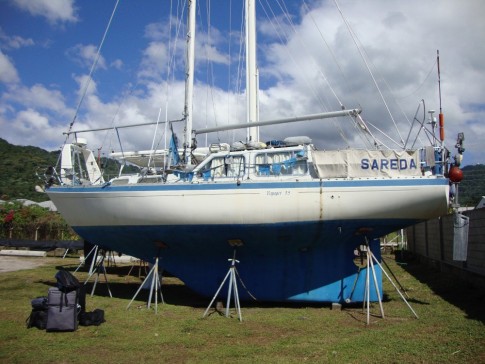 |
Our arrival back in Trinidad - preparation of the boat and departure to Grenada.
10 Photos
Created 5 March 2010
|
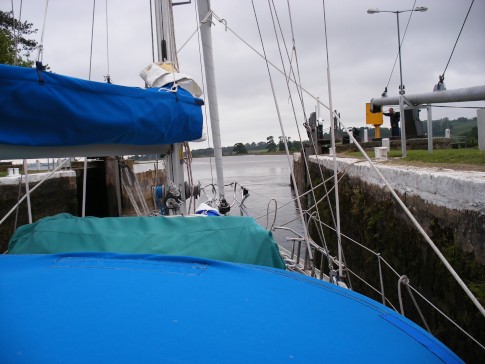 |
Our photos from when we left through France, Spain, Portugal, Madeira and Canaries
157 Photos
Created 5 March 2010
|
Sareda - Our Voyage
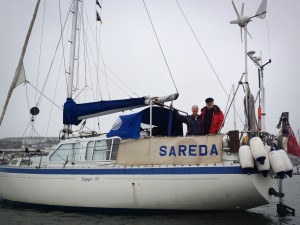
Who: Lin and Paul
Port: Dartmouth
